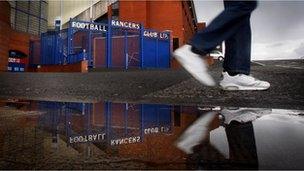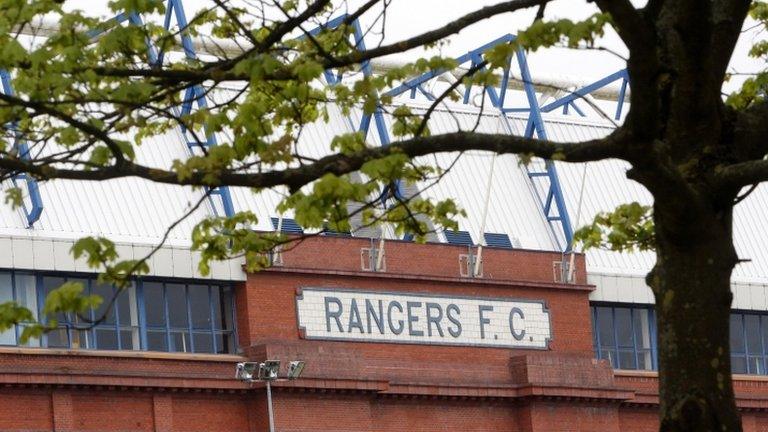Sky sets the limit
- Published

The focus of SPL chairmen will now be on whether to allow the new Rangers into the league
The proposed creditor deal has failed, and at 1pm today, shareholders were told it's all over for Rangers Football Club plc.
Ticketus, which, like HM Revenue and Customs, had a blocking vote - used it to support the deal. But the tax authority had already decided the outcome.
There's nothing more they can do about it by shareholders. The assets will be transferred - possibly as soon as this afternoon - to the new company controlled by Charles Green's consortium.
That means Rangers football club (the brand rather than the company) can go on playing. Its financial problems are now how to fund the future, rather than how to pay off the past.
The penalties for that past mismanagement will continue to sit in the empty shell that is Rangers Football Club plc, with the liquidators leaving no doubt that they're going after the individuals who made the calamitous decisions on avoiding tax and perhaps lots more besides.
Fresh start
So for Rangers fans, as HM Revenue and Customs has claimed, it could be a fresh start. However, with legal challenges and the big debt no longer hanging over it, the focus is now on the financial rules of football. And they're no less complex.
I won't go through them all here, as they've been well rehearsed elsewhere, except to say that a great deal comes back to Sky and ESPN, the broadcasters.
Last November, they signed a deal worth £80m for five years of the rights to broadcast SPL matches. The contract included a clause that allows it to withdraw if the Old Firm teams are no longer in the SPL.
Will it invoke that clause? Sky is not saying publicly, but it's the question that every SPL chairman and director needs answered.
The Daily Record claims today that a source at Sky says anything more than one year out of the SPL (ie relegation by one division, and return by the following season) would see the contract fall.
But an unattributed quote or two is not enough to take a decision that's vital to the future of all the SPL clubs.
Boycott threat
If the TV money isn't there, and other sponsorship reliant on exposure to the TV cameras, such as shirt logos, the clubs' business plans are thrown hugely out of kilter. In several cases, clubs stand a strong chance of being rendered insolvent.
And that's where company directors have to look to their responsibilities very closely. Yes, they're under growing pressure from fans of other teams to punish Rangers severely.
If they go easy and let the Ibrox team back into the SPL with few sanctions, those other clubs' fans could punish their directors by withholding ticket sales. But of course, it's impossible to gauge how widespread that would be.
Directors have to do what keeps the company solvent and trading, which means listening to customers and to those providing the revenue streams. In this case, those pressures seem to be in conflict. But if forced to choose between fan pressure and the threat to TV rights and sponsorship, the latter seems the more tangible threat, so that's the pressure that's likely to focus minds most.
Humongous gulf
The clubs will no doubt have noted the colossal TV rights deal signed between English football clubs and both Sky and BT: £3bn over three years.
That could have several effects on Scottish football. The most obvious is growth in the already humongous gulf between the financial resources on either side of the border, which will surely impact on player transfer fees and costs. The top flight of English football has around £56 for every £1 of TV money available to Scotland.
The other is that Scottish football fans will have to pay three different broadcasters of English and Scottish football if they're to see all matches in the top leagues.
There is a more positive prospect - that BT, to boost its offer on BT Vision, has become a serious player in buying football rights. And competition has to be good for the clubs.
As happened when Setanta went under, the collapse of the SPL deal with Sky and ESPN would be followed by a swift re-auctioning of rights, so don't assume all would be lost. The demise of Setanta didn't do as much damage to Scottish football as some feared.
But it still looks like BSkyB is in the driving seat. In the week the prime minister, chancellor and first minister are on the stand at the Leveson inquiry, it only emphasises the influence over British life of Rupert Murdoch's companies.
- Published14 June 2012
